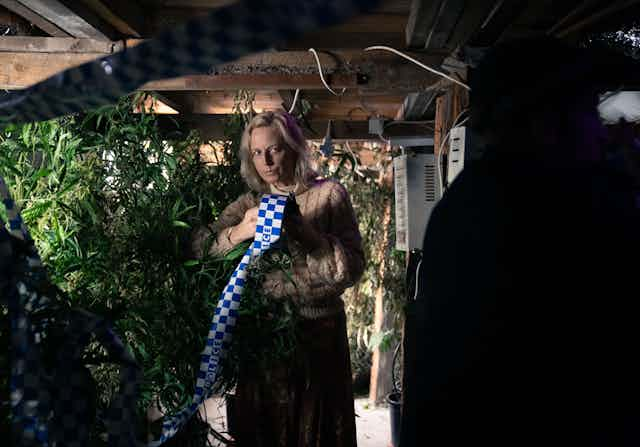Anika Van Cleef (Marta Dusseldorp) is a high-powered “Toorak Mum”. She is CEO of an investment company she took over from her controlling father and now runs with her new partner, Johann (Nikolai Nikolaeff).
But Anika is betrayed by Johann and becomes the target of an attempted murder. She soon discovers Johann has hired professional thugs to murder her and her children, Otis (Imi Mbedla) and Iris (Ava Caryofyllis).
A mysterious police detective, Airini (Rachel House), appears in a convenience shop. To escape the threat, Anika and her children must make the forced (and reluctant) relocation to a remote Tasmanian town.
They find themselves in Mystery Bay, humorously characterised by a Canberra politician as a place that “nobody’s ever heard of, boasts no features, and no outsider wants to visit”.
Bay of Fires, the new drama from the ABC, is arresting, dry and fast-paced. It brings new insights to national understandings of city-country divides and explores small town isolation as a means of social control.
But perhaps most interestingly is the way it advances the genre of Australian Gothic in humorous and unexpected ways.
An Australian Gothic
Mystery Bay is a quiet and insular community, nicknamed Misery Bay by the locals.
The locals observe the strangers’ arrival with forensic attention. They are variously suspicious, hostile and strange. As we get to know the townsfolk, they open the door into a Gothic world of mystery and the supernatural.
The rural Tasmanian landscape has a dark power, but the haunting vistas pale in comparison to the layers of criminal activity and depraved lives eking out an existence in entangled community relations.
Australian Gothic began in the late 19th and early 20th centuries, combining elements of traditional European Gothic literature – characterised by horror, mystery and the supernatural – mixed with the unique Australian landscape, history and cultural identity.

The harsh and unforgiving Australian environment provided a fertile ground for the development of a distinctive Gothic tradition.
Vast and desolate landscapes, rugged coastlines and extreme weather conditions replaced European cathedrals and graveyards. Settlers faced isolation, death and the brutal realities of the convict system. They encountered other worlds through Indigenous Australian communities.
These experiences became a central theme in Australian Gothic literature and the sub-genre Tasmanian Gothic.
There are remarkable resonances between Bay of Fires and early examples of Australian Gothic, such as Marcus Clarke’s novel For the Term of His Natural Life (1874), which portrays the horrors of the penal colony system and the brutal treatment of convicts.

As with Clarke’s novel, Bay of Fires is set against the backdrop of the harsh Tasmanian wilderness. Both explore themes of oppression and isolation. The first moments of Anika and her children’s arrival in Tasmania clearly mark the landscape as dangerous. They hit a large kangaroo on the road to Mystery Bay and their BMW is completely written off.
Machines are no match for the wild animals of Tasmania.
The genre isn’t without levity. Joseph Furphy’s Such Is Life (1903) is a darkly humorous and ironic portrayal of rural life. Mystery Bay continues this in a dry satire of country town life. The shops won’t open for the newcomers. People are highly suspicious of them, and basic life tasks are made almost impossible by the hostile nature of local culture.
The Gothic tradition is extended in Australian literature in the works of contemporary authors such as Peter Carey, Kate Grenville and Tim Winton, and in film (Picnic at Hanging Rock, The Babadook), visual arts (Arthur Boyd, Fred Williams) and music (Nick Cave, The Church).
Read more: Australian Gothic: from Hanging Rock to Nick Cave and Kylie, this genre explores our dark side
Twisting the genre
Bay of Fires is a continuation of this significant Australian genre.
It draws on the conventions of traditional Gothic literature in its reflections of the harsh realities and haunting beauty of the Australian environment and the mysterious – indeed treacherous – characters of the cold townspeople.
However, there is a tongue-in-cheek humour and astute commentary of social class that offers a new dimension to this established settler colonial Australian tradition. Otis (Imi Mbedla) is particularly amusing, offering ongoing critical commentary on race, class and gender.

This insightful humour is a new angle on Tasmanian Gothic’s combination of horror, mystery and the grotesque. When asked by his sister why all the townsfolk are staring at them, Otis replies: “Because she’s a Toorak wanker and we are private school dickheads”.
This wry commentary breaks up the traditional dark and atmospheric tone of Tasmanian Gothic which, when it employs humour, is usually elements of gallows humour, black comedy or irony. Bay of Fires has a much stronger emphasis on humour and a comedy that is almost slapstick.
The series captures dark and mysterious aspects of the nation’s past and present which shape our national imagination and the Australian Gothic genre, all with a larrikin wit.
Read more: How Deadloch flips the Nordic Noir crime genre on its arse and makes it funny

